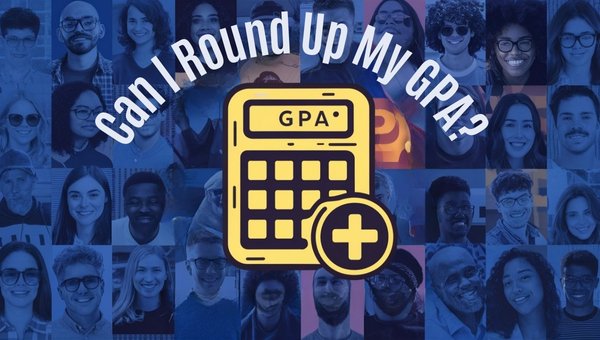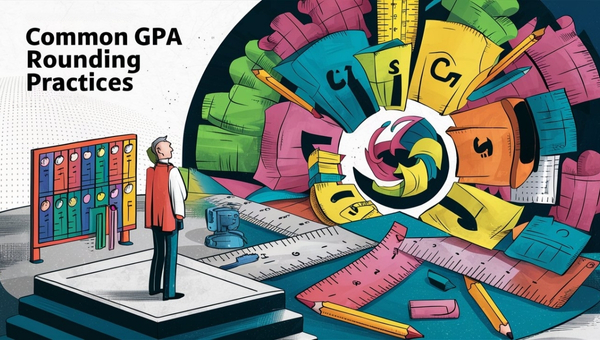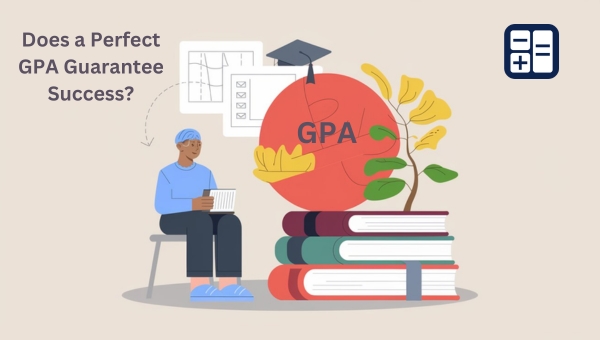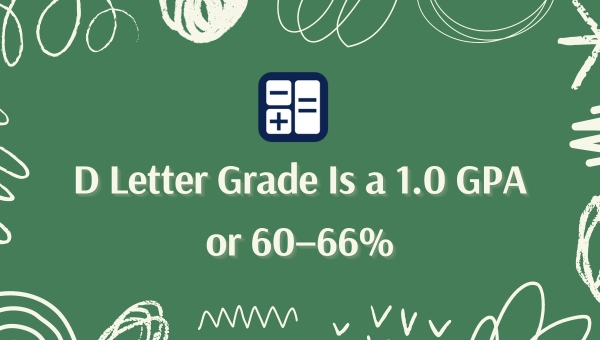Can I Round Up My GPA? Everything You Need to Know

The complexities of GPA rounding can be daunting, but it’s crucial to understand the ins and outs. In this comprehensive guide, we’ll delve into the rules, acceptable scenarios, and common practices surrounding GPA rounding.
We’ll also explore the ethical considerations and potential consequences of rounding your GPA inappropriately. Furthermore, we’ll discuss alternative approaches to highlight your strengths without altering your GPA. By the end, you’ll have a clear understanding of when and how you can round up your GPA, ensuring you make informed decisions.
A Closer Look at Round Up My GPA
Navigating the topic of GPA rounding can be a bit tricky, but it’s essential for students who want to present their academic achievements accurately. When it comes to rounding your GPA, various rules and guidelines come into play.

These can vary depending on your institution or the specific context in which you are using your GPA. It is important to understand not only the general rules but also the scenarios in which rounding is acceptable.
Rounding Rules and Guidelines
Firstly, let’s delve into the general rules and guidelines for rounding GPAs. Most institutions have specific policies regarding how GPA rounding should be handled.
Here are some common guidelines:
- Decimal Places: Typically, GPAs are calculated to two decimal places. For example, a GPA of 3.456 would usually be rounded to 3.46.
- Rounding Up: If the third decimal place is 5 or higher, you round up. For instance, 3.455 would round up to 3.46.
- Rounding Down: If the third decimal place is less than 5, you round down. For example, 3.454 would round down to 3.45.
- Institution Policies: Some institutions may have specific rules that override the general rounding principles. Always check with your academic advisor or the registrar’s office for your school’s policy.
- Reporting Format: When reporting your GPA on resumes or applications, it’s crucial to follow the accepted format, which usually includes two decimal places.
Understanding these guidelines is crucial to ensure that your GPA is represented accurately and fairly.
Acceptable Rounding Scenarios
Now, let’s explore when it is acceptable to round your GPA and the common practices associated with it. In many cases, rounding your GPA is a standard practice, but it’s essential to know when it is appropriate:
- Job Applications: When applying for jobs, rounding your GPA to two decimal places is generally acceptable. For example, a GPA of 3.456 can be rounded to 3.46.
- Scholarship Applications: Similar to job applications, scholarship committees often expect GPAs to be rounded to two decimal places.
- Graduate School Applications: Most graduate programs require you to report your GPA rounded to two decimal places. Always verify the specific requirement of each program to ensure compliance.
- Transcripts: When it comes to official transcripts, always report your GPA exactly as it appears on your transcript. Do not round unless instructed by the institution.
In these scenarios, rounding your GPA is not only acceptable but also expected. However, always make sure to adhere to the specific requirements of the institution or organization you are reporting to. This ensures that you maintain transparency and accuracy in your academic reporting.
Common GPA Rounding Practices
Navigating the realm of GPA rounding can be tricky. Many students wonder whether they can round up their GPA to present a better academic profile. Let’s dive in and explore some common practices and considerations when it comes to rounding your GPA.

Potential Consequences
Rounding your GPA inappropriately can lead to serious consequences. Here are some key points to consider:
- Misrepresentation: If you round your GPA without proper justification, it may be considered a form of dishonesty. This can damage your reputation.
- Verification Issues: Employers and educational institutions often verify GPAs through official transcripts. A discrepancy between your reported GPA and your actual GPA can lead to questions about your integrity.
- Trust Erosion: Once an employer or institution discovers the inaccuracy, it can erode trust, making it difficult to secure the position or admission you seek.
- Future Implications: Even if the rounding seems minor, it can have long-term effects on your career and educational prospects.
Transparency With Employers
Being transparent about any rounding done to your GPA is crucial. Here’s why:
- Honesty: Demonstrating honesty and integrity can set you apart from other candidates.
- Clarity: Clearly communicate any rounding in your resume or cover letter, explaining the context.
- Verification Readiness: Be prepared for employers to request your official transcript. Transparency ensures there are no surprises during the verification process.
- Professionalism: Highlighting your commitment to ethical practices can positively influence employers’ perceptions of your professionalism.
By considering these points, you can make informed decisions about whether and how to round your GPA, ensuring you maintain credibility in your academic and professional journey.
Ethical Considerations
When it comes to rounding up your GPA, there are several ethical considerations to keep in mind. It’s not just about numbers; it’s about maintaining integrity and trust in your academic and professional life. Let’s delve into the potential consequences and the importance of transparency with employers.

Potential Consequences
Rounding up your GPA might seem like a minor adjustment, but it can have significant ethical implications.
Misrepresenting your GPA can:
- Damage Trust: If an employer discovers that you’ve rounded up your GPA, it could erode their trust in you.
- Harm Your Reputation: Once caught, your professional reputation may suffer, making future job opportunities harder to secure.
- Lead to Job Loss: In severe cases, this could even lead to the termination of your employment if the misrepresentation is deemed serious.
Transparency With Employers
Being transparent with potential employers about your GPA is crucial. Honesty, after all, is the best policy. Here’s why:
- Builds Trust: Being upfront about your academic achievements fosters trust between you and your employer.
- Reflects Integrity: Transparency shows that you value integrity, a quality that many employers find desirable.
- Avoids Future Issues: Honesty from the start prevents any potential problems down the line if discrepancies are discovered.
Employers appreciate candidates who are honest and straightforward. Highlighting your genuine achievements can pave the way for a trustworthy and respectful professional relationship.
Alternative Approaches
When it comes to presenting your academic achievements, there are several other ways to showcase your strengths without altering your GPA. Let’s delve into some effective strategies that can make your resume stand out.
Emphasizing Strong Points
Instead of focusing solely on your GPA, consider highlighting other strong points that reflect your capabilities and accomplishments.
Here are some approaches:
- Relevant Coursework: Mention the courses that are directly related to the job you’re applying for. This demonstrates your specialized knowledge and skills.
- Skills and Certifications: List any certifications or skills that are pertinent to the position. These can often be more impactful than a GPA.
- Projects and Research: If you’ve worked on significant projects or research, describe your role and the outcomes. This can show your practical experience and problem-solving abilities.
Highlighting Relevant Achievements
Another effective way to make your resume stand out is by emphasizing your relevant achievements. This can give potential employers a clearer picture of your strengths and qualifications.
- Special Projects: Include any special projects that you have completed. Highlight what you did, the skills you used, and the results you achieved.
- Awards and Honors: If you’ve received any awards or honors, make sure to list them. This can be a testament to your hard work and dedication.
- Extracurricular Activities: Mention any extracurricular activities that demonstrate leadership, teamwork, or other valuable skills. These activities can provide insight into your overall character and abilities.
By focusing on these aspects, you can create a more comprehensive and compelling resume that goes beyond just your GPA. This approach can help you stand out in a competitive job market and showcase the full range of your talents and achievements.
FAQs
Can I round up my GPA on a college application?
It’s generally not recommended to round up your GPA on a college application. Most institutions prefer the precise figure to ensure accuracy in their evaluation process.
Should I put 3.1 GPA on a resume?
Yes, you can put a 3.1 GPA on your resume. It’s best to be honest and accurate to maintain credibility with potential employers.
Is a 3.2 GPA good in college?
A 3.2 GPA is considered above average in college. It indicates consistent performance and a good understanding of your coursework.
Conclusion
Rounding up your GPA can be a delicate matter. It’s crucial to understand the rules and guidelines provided by your academic institution. Additionally, being transparent with employers about any rounding practices is essential to maintain trust and credibility.
Ethical considerations should always be at the forefront when making such decisions. Rather than altering your GPA, consider emphasizing your strengths and achievements in other areas of your resume. Explore more insightful articles on our site to further enhance your academic and professional journey!




